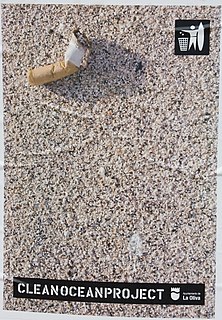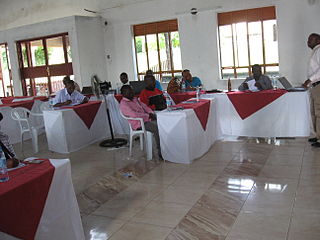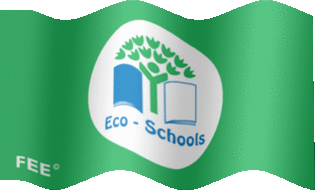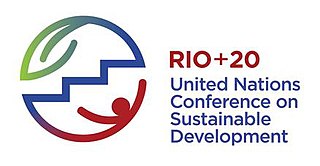Related Research Articles

Sustainable development is an organizing principle for meeting human development goals while simultaneously sustaining the ability of natural systems to provide the natural resources and ecosystem services on which the economy and society depend. The desired result is a state of society where living conditions and resources are used to continue to meet human needs without undermining the integrity and stability of the natural system. Sustainable development can be defined as development that meets the needs of the present without compromising the ability of future generations to meet their own needs.

The United Nations Environment Programme (UNEP) is responsible for coordinating responses to environmental issues within the United Nations system. It was established by Maurice Strong, its first director, after the United Nations Conference on the Human Environment in Stockholm in June 1972. Its mandate is to provide leadership, deliver science and develop solutions on a wide range of issues, including climate change, the management of marine and terrestrial ecosystems, and green economic development. The organization also develops international environmental agreements; publishes and promotes environmental science and helps national governments achieve environmental targets.

Agenda 21 is a non binding action plan of the United Nations with regard to sustainable development. It is a product of the Earth Summit held in Rio de Janeiro, Brazil, in 1992. It is an action agenda for the UN, other multilateral organizations, and individual governments around the world that can be executed at local, national, and global levels. One major objective of the Agenda 21 initiative is that every local government should draw its own local Agenda 21. Its aim initially was to achieve global sustainable development by 2000, with the "21" in Agenda 21 referring to the original target of the 21st century.

Environmental protection is the practice of protecting the natural environment by individuals, organizations and governments. Its objectives are to conserve natural resources and the existing natural environment and, where possible, to repair damage and reverse trends.
The Earth Charter is an international declaration of fundamental values and principles considered useful by its supporters for building a just, sustainable, and peaceful global society in the 21st century. Created by a global consultation process, and endorsed by organizations representing millions of people, the Charter "seeks to inspire in all peoples a sense of global interdependence and shared responsibility for the well-being of the human family, the greater community of life, and future generations." It calls upon humanity to help create a global partnership at a critical juncture in history. The Earth Charter's ethical vision proposes that environmental protection, human rights, equitable human development, and peace are interdependent and indivisible. The Charter attempts to provide a new framework for thinking about and addressing these issues. The Earth Charter Initiative organization exists to promote the Charter.

The Millennium Development Goals (MDGs) were eight international development goals for the year 2015 that had been established following the Millennium Summit of the United Nations in 2000, following the adoption of the United Nations Millennium Declaration. These were based on the OECD DAC International Development Goals agreed by Development Ministers in the "Shaping the 21st Century Strategy". The Sustainable Development Goals (SDGs) succeeded the MDGs in 2016.

Education for sustainable development (ESD) is defined as education that encourages changes in knowledge, skills, values and attitudes to enable a more sustainable and just society for all. ESD aims to empower and equip current and future generations to meet their needs using a balanced and integrated approach to the economic, social and environmental dimensions of sustainable development. ESD is the term most used internationally and by the United Nations.

Environmental education (EE) refers to organized efforts to teach how natural environments function, and particularly, how human beings can manage behavior and ecosystems to live sustainably. It is a multi-disciplinary field integrating disciplines such as biology, chemistry, physics, ecology, earth science, atmospheric science, mathematics, and geography. The United Nations Educational, Scientific and Cultural Organisation (UNESCO) states that EE is vital in imparting an inherent respect for nature among society and in enhancing public environmental awareness. UNESCO emphasises the role of EE in safeguarding future global developments of societal quality of life (QOL), through the protection of the environment, eradication of poverty, minimization of inequalities and insurance of sustainable development. The term often implies education within the school system, from primary to post-secondary. However, it sometimes includes all efforts to educate the public and other audiences, including print materials, websites, media campaigns, etc.. There are also ways that environmental education is taught outside the traditional classroom. Aquariums, zoos, parks, and nature centers all have ways of teaching the public about the environment.
The Centre for Environment Education (CEE) in India was established in August 1984 as a Centre of Excellence supported by the Ministry of Environment and Forests. The organisation works towards developing programmes and materials to increase awareness about the environment and sustainable development. The head office is located in Ahmedabad. The Centre has 41 offices across India including regional cells in Bangalore (South), Guwahati, Lucknow (North), Ahmedabad (West) and Pune (Central); state offices in Delhi, Hyderabad, Raipur, Goa, Coimbatore; and several field offices. It has international offices in Australia and Sri Lanka.
Steven Clark Rockefeller is a fourth-generation member of the Rockefeller family, and a former dean of Middlebury College. He is one of the oldest living members of the family who still carries the Rockefeller name, in addition to John D. Rockefeller IV.

Eco-Schools is an international programme of the Foundation for Environmental Education (FEE) that aims to “empower students to be the change our sustainable world needs by engaging them in fun, action-orientated, and socially responsible learning.”

Sustainable cities, urban sustainability, or eco-city is a city designed with consideration for social, economic, environmental impact, and resilient habitat for existing populations, without compromising the ability of future generations to experience the same. The UN Sustainable Development Goal 11 defines sustainable cities as those that are dedicated to achieving green sustainability, social sustainability and economic sustainability. They are committed to doing so by enabling opportunities for all through a design focused on inclusivity as well as maintaining a sustainable economic growth. The focus also includes minimizing required inputs of energy, water, and food, and drastically reducing waste, output of heat, air pollution – CO2, methane, and water pollution. Richard Register first coined the term ecocity in his 1987 book Ecocity Berkeley: Building Cities for a Healthy Future, where he offers innovative city planning solutions that would work anywhere. Other leading figures who envisioned sustainable cities are architect Paul F Downton, who later founded the company Ecopolis Pty Ltd, as well as authors Timothy Beatley and Steffen Lehmann, who have written extensively on the subject. The field of industrial ecology is sometimes used in planning these cities.
Sustainability measurement is the quantitative basis for the informed management of sustainability. The metrics used for the measurement of sustainability are still evolving: they include indicators, benchmarks, audits, sustainability standards and certification systems like Fairtrade and Organic, indexes and accounting, as well as assessment, appraisal and other reporting systems. They are applied over a wide range of spatial and temporal scales.
In response to the United Nations Decade of Education for Sustainable Development, the United Nations University (UNU) called for the development of regional networks for the promotion of Education for Sustainable Development (ESD). These networks address local sustainable development challenges through research and capacity development. This was the birth of Regional Centres of Expertise on ESD (RCEs). RCEs are acknowledged by the UNU based on recommendations of the Ubuntu Committee of Peers for the RCEs, which consists of signatories of the Ubuntu Declaration signed in 2002.

The United Nations Conference on Sustainable Development (UNCSD), also known as Rio 2012, Rio+20, or Earth Summit 2012 was the third international conference on sustainable development aimed at reconciling the economic and environmental goals of the global community. Hosted by Brazil in Rio de Janeiro from 13 to 22 June 2012, Rio+20 was a 20-year follow-up to the 1992 United Nations Conference on Environment and Development (UNCED) held in the same city, and the 10th anniversary of the 2002 World Summit on Sustainable Development (WSSD) in Johannesburg.
Earth system governance is a recently developed paradigm that builds on earlier notions of environmental policy and nature conservation, but puts these into the broader context of human-induced transformations of the entire earth system.

The Sustainable Development Goals (SDGs) or Global Goals are a collection of 17 interlinked global goals designed to be a "blueprint to achieve a better and more sustainable future for all". The SDGs were set up in 2015 by the United Nations General Assembly (UN-GA) and are intended to be achieved by the year 2030. They are included in a UN-GA Resolution called the 2030 Agenda or what is colloquially known as Agenda 2030. The SDGs were developed in the Post-2015 Development Agenda as the future global development framework to succeed the Millennium Development Goals which ended in 2015.
Climate change education (CCE) is education that aims to address and develop effective responses to climate change. It helps learners understand the causes and consequences of climate change, prepares them to live with the impacts of climate change and empowers learners to take appropriate actions to adopt more sustainable lifestyles.

Daniella Tilbury is a Gibraltarian academic, educator and sustainable development leader who was the first woman in her country to hold the title of university professor. The inaugural Vice-Chancellor and CEO of the University of Gibraltar, Tilbury, who has long been involved in sustainability issues became the first Commissioner for Sustainable Development in May 2018. She was recognized as an honorary don of St Catharine's College, Cambridge in July 2018 because of her scientific and social contributions.
Monitoring Education for Sustainable Development (ESD) refers to measuring progress in ESD learning compared to policy commitments, provision, institutional support, resources and others. Monitoring and evaluation (M&E) of Education for Sustainable Development is widely discussed in literature on ESD, including debates regarding methodology and strategies for interpreting the data.
References
- 1 2 "Une grande conférence sur l'éducation relative à l'environnement crée une synergie avec la DEDD". UNESCO. Archived from the original on 2013-04-16. Retrieved 2007-11-23.
- ↑ "Fourth International Conference on Environmental Education". Australian Education International, Australian Government. Retrieved 2007-11-23.[ permanent dead link ]
- ↑ "4th International Conference on Environmental Education: 'Environmental Education towards a Sustainable Future – Partners for the Decade of Education for Sustainable Development'". Green Buildings. Archived from the original on 2007-10-19. Retrieved 2007-11-23.
- ↑ "Environmental Education towards a Sustainable Future - Partners for DESD". Instituto da Conservacao da Natureza. Retrieved 2007-11-24.[ dead link ]
- 1 2 "Promoting environmental education towards a sustainable future". eGov Monitor. Archived from the original on 2011-07-10. Retrieved 2007-11-24.